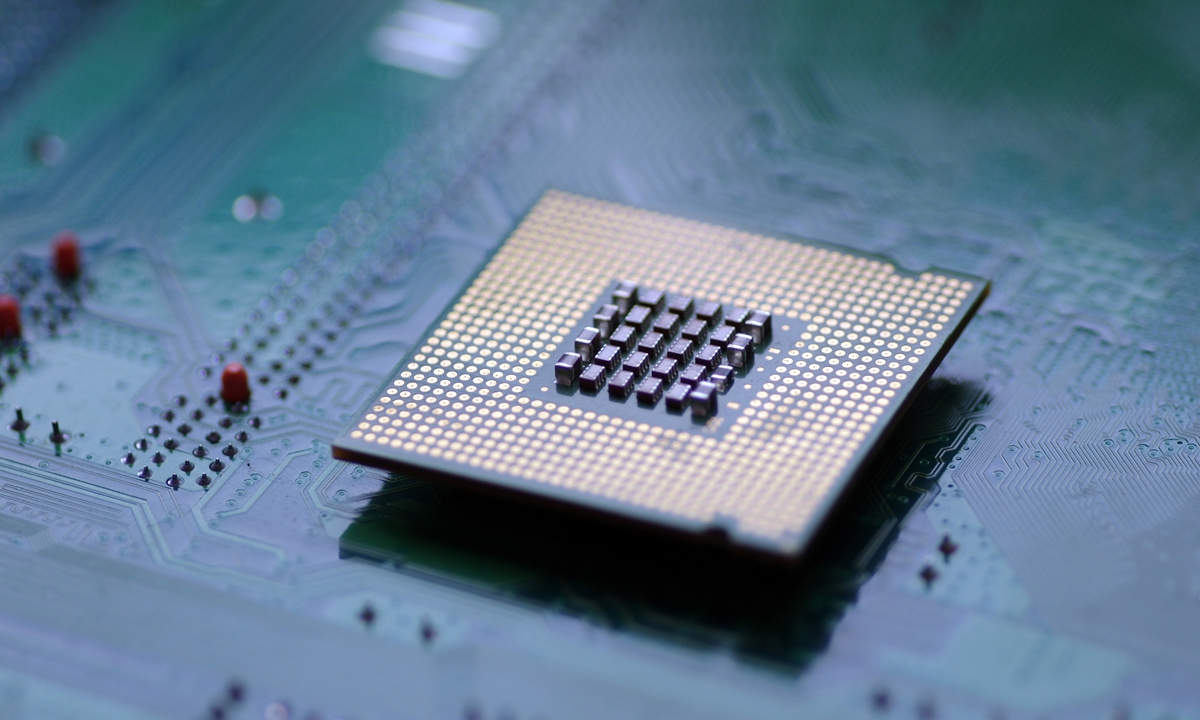
chip Photo:VCG
The White House meeting on a global chip shortage scheduled for Monday reportedly includes almost 20 multinational companies but excludes all key players from the Chinese mainland. In addition, the US Senate is scheduled to hold a hearing on Wednesday on a draft tech bill aimed at competing with China.
Linked with the US' recent sanctions on seven more Chinese tech firms and entities, the chip meeting appears to be another Washington-led political maneuver to persuade its allies to contain China's high-tech sector development.
Undoubtedly, the chip sector is set to become a key front of battle between US' technology hegemony and the world's anti-hegemony, but this time the US politicians are showing insufficiency in both confidence and strength.
Why does the US is trying to persuade its allies to counter China in the semiconductor sector? On one hand, the US is not leading in semiconductor manufacturing. There are only two manufacturers in the world - TSMC, which is based in the island of Taiwan, and South Korea's Samsung - have grasped the advanced 7-nanometer process technology. Neither of them is an American company. On the other hand, China's countermeasures against the US' relentless crackdown have taken effect, and the US has to change course.
For a period of time, the US has been trying to strangle China's semiconductor sector through measures including banning sales, but such calculation seems to have failed. The bans did have some negative impact on Chinese smartphone makers, but did not put Chinese key tech sectors into predicament. Even under the US' constant assaults, Huawei's performance in 2020 still remained strong and achieves positive growth, which demonstrates the Chinese tech giant' strength.
How should China deal with a protracted battle against hegemony in the chip sector? China should stick to self-reliance when it comes to developing technologies and develop our own alternative route in basic technology competition. Chinese scientists and engineers had in fact achieved substantial breakthroughs across sever key areas.
Several months ago, China Aerospace Science and Industry Corporation Limited (CASIC) had broken the "choke point" of the dependence on US technologies of high-performance computer systems in key industries. With home-developed software, the solution can replace the US hardware with better performance and lower cost.
In basic research of semiconductor sector, Chinese scientists have used carbon-based chips to replace traditional silicon-based chips with carbon-based chips, and 7-nanometer capabilities of silicon-based chips can be achieved by using a process of tens of nanometers carbon-based chips. Chinese technology development was sought through hardworking and innovation, not degrading measures like trying to strangle other countries.
In fact, the US media outlets had pointed out that the US sanctions against China's advanced manufacturing sector will help "make China ever greater again."
The report pointed out that "although the US sanctions will cause a short-term crisis for these Chinese companies, in the long run, the measures will only bolster China's development." And such arguments have been proved to be right.
The Biden administration has repeatedly emphasized the necessity to return to multilateralism. However, its approach to form a US-led clan is in essence the same with the previous US government's approach of exerting pressure on China's technology development, following the old path of unilateralism and isolationism. The US cannot isolate China, it can only exacerbate its own isolation.
The author is deputy designer director of information technology innovation project under CASIC. bizopinion@globaltimes.com.cn




